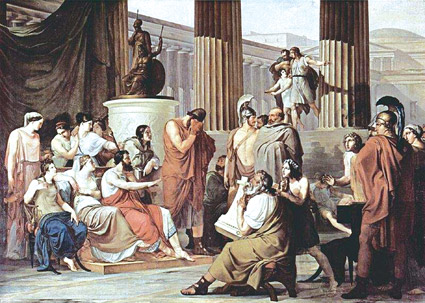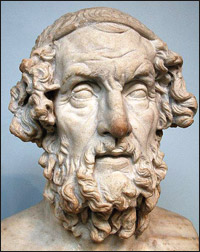Greek Epics: Gods, Men and Humaneness
 This
week we want our readers, particularly the young ones, to follow some
impressions that yours truly had formed as imprinted in his mind
regarding the relationship that the Gods had with the Humans as we read
Homer's (the Greek Epic Poet) The Iliad and the Odyssey via English. This
week we want our readers, particularly the young ones, to follow some
impressions that yours truly had formed as imprinted in his mind
regarding the relationship that the Gods had with the Humans as we read
Homer's (the Greek Epic Poet) The Iliad and the Odyssey via English.
The first thing that comes to my memory is that there is a kind of
affinity in both Greek and Hindu mythology and epics. There are almost
similar characters in the Iliad and the Mahabharata. Let's leave that
comparison for a later day and come to the point about our main concern
here.
|

Odysseus Overcome by Demodocusí Song, by Francesco Hayez |
The Gods in the Iliad are very human in that they behave like human
beings.
They are not contemptuous of human beings. However they take sides.
Some times they suppose forces at the same time.
They disguise themselves as human beings and help the human beings
whom they like.
They expect sacrifices from the human beings.
The Gods are always involved in some kind of activity in relation to
the human beings.
We must remember the fact that the Iliad depicted the Heroic Age. And
War and Peace was its theme. It was a warrior culture that prevailed in
what may be called primitive times.
Our key point here is the presence of humaneness amidst a war
situation.
A redeeming feature was that amidst hatred and war there laid dormant
human kindness. As we learn the essence western classical culture then
was Humanism. And this is best manifested in the parts played by the
Gods in the Iliad. The divine blessings are transferred to the humans.
If you would remember the incident in the epic where soon after the
death of Hector, Achilles meets Priam. There is an expression of
humanism shown in the scene. This meeting could be considered as the
climax of the epic in terms of the essence of what western classical
culture was, namely Humanism.
Achilles was a true warrior, prowess in battle and honour and fame
were his true mettle. But he was also human. He dragged Hector along the
battle field after killing him. That was part of the military or martial
tradition. But the most important thing was that once his enemy was
killed, his hatred towards the Trojans declined. He honours and respects
hector's father Priam and even weeps with him. This was a climactic
point. It was also the kernel of human relationship.
|

Homer |
This reminds us of how Lanka's recorded history says that the Sinhala
king Duttu Gemunu after killing the Chola dynasty king Ellalan (Elara in
Pali) erected a statue for the dethroned king and asked his people to
show respects to the statue while they passed that way.
It must be pointed that that Achilles had nothing against the Trojans
personally. This he had said at the beginning of the epic. He really
went to battle with them for the sake of Agamemnon. But he came back
sulking because Agamemnon had insulted him by taking over his Trojan
captive Brusis. He returned to the battle only after Agamemnon begging
him to come to his rescue. It was also because Patrioclus had been
killed by Hector.
Therefore the return of Achilles to the battle field was for Honour-
which was one of the characteristics in the Heroic Age. The other
aspects were Aristocratic, Martial, Patriarchal and Individualistic.
To avenge his friend's death Achilles went back to the battle field
and ultimately brought honour for himself and to the Achaeans.
Here lies the importance of the shield of Achilles. The shield by
itself was nothing important but what it signified was great. It was the
symbol of Honour and Glory which were the hallmarks of the Heroic Age.
The Gods physically came down to earth as if in a machine.
Knowledgeable theatre people amongst us would know that in Greek Drama,
Deux-ex- machina was a device where the Gods were brought to solve the
climax of a play. The Gods took part in the battle and other affairs of
the people.
More on ancient Greek culture later.
[email protected]
|



